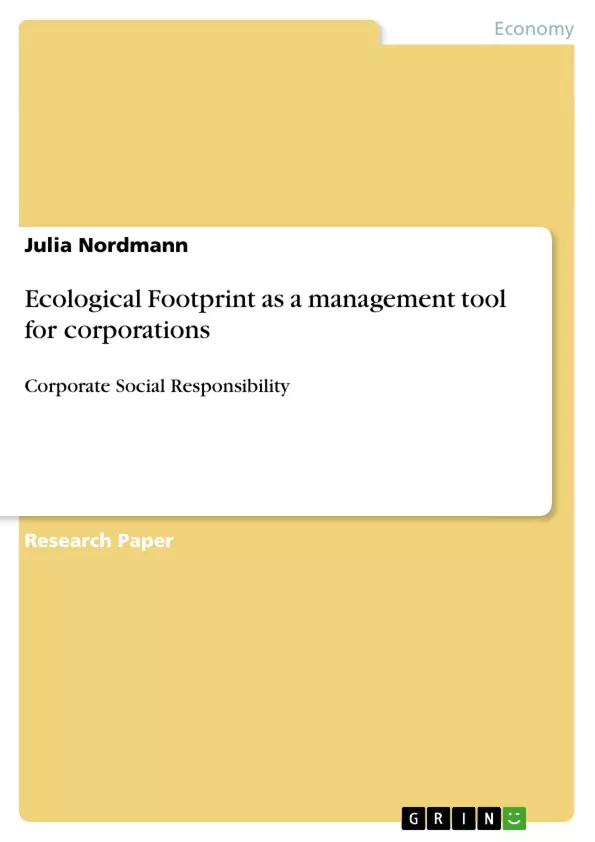In this paper, the value of the Ecological Footprint as a management tool for corporations that wish to operate in an environmentally responsible manner will be discussed. The paper will be outlined as followed: First, the macro context of today's corporations operating in a globalized economy will be outlined briefly in order to disclose the environmental challenges economic entities are currently facing. Second, I will analyse the key features of the Ecological Footprint in relation to a discussion of the key characteristics that constitute corporate environmentally responsible behaviour and how environmental responsibility relates to the concept of Sustainable Development (SD). Subsequently, the third and main part of the paper will discuss the application of the Ecological Footprint using case studies to demonstrate possible business outcomes. In the conclusion, the results of the analysis will be revised in order to achieve a well- rounded understanding of the potentials and limits of the Ecological Footprint as a management tool to monitor and manage ecological assets.
Inhaltsverzeichnis (Table of Contents)
- Introduction
- The Macro Context of Corporations in the Globalized Economy
- Calculating Environmental Impacts: The Ecological Footprint in Application
- The Ecological Footprint, Corporate Environmental Responsibility and Sustainable Development
- Applying the Ecological Footprint in Water Services-Case Study: Anglian Water Services
- Applying the Ecological Footprint in Socially Responsible Investment- Case Study: Bank Sarasin
- Discussion and Conclusion
Zielsetzung und Themenschwerpunkte (Objectives and Key Themes)
This paper explores the value of the Ecological Footprint as a management tool for corporations seeking to operate in an environmentally responsible manner. It examines the broader context of corporations within a globalized economy, emphasizing the environmental challenges they face. The paper then analyzes the key characteristics of the Ecological Footprint and its relation to corporate environmental responsibility and sustainable development. Finally, through case studies, it demonstrates the application of the Ecological Footprint in water services and socially responsible investment.
- The environmental challenges facing corporations in a globalized economy
- The role of the Ecological Footprint in measuring and managing environmental impacts
- The relationship between corporate environmental responsibility and sustainable development
- The application of the Ecological Footprint in business contexts
- The potential and limitations of the Ecological Footprint as a management tool
Zusammenfassung der Kapitel (Chapter Summaries)
The introduction sets the stage for the paper by outlining the increasing importance of effective environmental management for corporations. It highlights the growing awareness of environmental issues, the need for sustainable development, and the role of corporations in achieving this goal.
The second chapter provides an overview of the macro context of corporations in a globalized economy. It discusses the environmental challenges corporations face, including resource depletion, pollution, and climate change. The chapter emphasizes the importance of considering external effects and incorporating them into production costs.
The third chapter delves into the Ecological Footprint as a management tool. It explains how the Footprint measures human demand on the environment, highlighting the current overexploitation of the biosphere. The chapter also discusses the benefits of using the Ecological Footprint for corporations, including improved market foresight and the ability to identify strategies for a resource-constrained world.
Schlüsselwörter (Keywords)
The key concepts discussed in this paper include corporate environmental responsibility, sustainable development, ecological footprint, resource management, environmental challenges, case studies, water services, socially responsible investment, globalized economy, and environmental management tools.
Frequently Asked Questions
What is the Ecological Footprint in a corporate context?
It is a management tool used by corporations to measure their demand on the environment and monitor their ecological assets.
How does the Ecological Footprint relate to Sustainable Development?
The Footprint helps businesses align their operations with the principles of sustainable development by identifying resource overexploitation.
Which case studies are analyzed in the paper?
The paper examines Anglian Water Services (water services) and Bank Sarasin (socially responsible investment) to demonstrate practical applications.
What are the benefits for a company using this tool?
Benefits include improved market foresight and the ability to develop strategies for a world with increasingly constrained resources.
What are the environmental challenges for globalized corporations?
Corporations face challenges such as resource depletion, pollution, and climate change, which necessitate effective environmental management.
What are the limitations of the Ecological Footprint?
The paper concludes with a discussion on both the potential and the limits of the tool as a monitoring mechanism for ecological impacts.
- Quote paper
- Julia Nordmann (Author), 2012, Ecological Footprint as a management tool for corporations, Munich, GRIN Verlag, https://www.grin.com/document/206910



